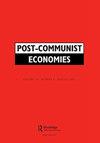Social trust and risky financial market participation: Evidence from China
IF 1.8
3区 经济学
Q2 ECONOMICS
引用次数: 0
Abstract
ABSTRACTThe Chinese government has promoted the development of risky financial markets under the market-oriented reform period. Meanwhile, social trust has changed with institutional transitions. This study investigates the influence of social trust on risky financial market participation in China based on the national longitudinal data of 2014–2018. It also estimates the effects of social trust by education, age, urban/rural hukou resident groups, and periods. The empirical results indicate that social trust positively affects the probability of holding risky financial assets and their shares. However, these effects turn insignificant when accounting for unobservable individual heterogeneity. The positive effect of social trust is more pronounced among the younger generation, highly educated groups, women, and urban hukou residents compared to their counterparts. Additionally, the positive impact of social trust is observed to be stronger in the period following the 2015 stock market crash shock than in the period before 2015.KEYWORDS: Social trustrisky financial marketrisky financial assetChina Disclosure statementNo potential conflict of interest was reported by the author.Notes1. In 2015, stock prices, which had been rising since the beginning of the year, collapsed on June 12. Within a month, A-shares on the Shanghai Stock Exchange lost one-third of their total stock market capitalisation. An unprecedented situation emerged in the Shanghai A-share market, with nearly half of the stocks suspended from trading. The government implemented financial market bailout policies, including massive funds, and the stock market returned to its starting point in October. This event is known as the 2015 stock market crash shock.2. The options for each question ranged from 0 (do not trust) to 10 (completely trust). I calculated the total value of these two questions. I also performed the estimations using the trust in a stranger or trust in a foreigner separately; the results were approximately similar to those that used the total score of these two indicators. Hence, I only presented the results using these two indicators in this study. The other results are available upon request.3. There are thirteen options for the question, ‘Which organisations are you a member of?’ They are as follows: (1) Communist Party of China; (2) Democratic party; (3) People’s Congresses (representatives) at the county/district level and above the county/district level; (4) County/district and above county/district Political Consultative Conference (Member); (5) Trade union; (6) Communist Youth League; (7) Women’s Federation; (8) Federation of Industry and Commerce; (9) Informal networking organisations (communities, networks, salons, etc.); (10) religious/belief group; (11) Association of private business owners; (12) Self-employed workers association; (13) Others. The dummy variable for Communist Party of China membership is set to 1 if a respondent selected option (1) and 0 if the respondent selected any other option from (2) to (13).4. The study used per capita household income and owning housing as income factors’ indices, in line with previous studies (Chen & Ji, Citation2017; Chetty et al., Citation2017; Ge et al., Citation2021). It was found that there may be a correlation between these two variables. I calculated the correlation coefficient of household income and owning housing and found the value to be 0.175, reflecting that the collinearity problem between these two variables may be ignored.5. For the question ‘What do you think of your financial literacy?’, the value is equal to 1 when the choice is ‘high level’ or ‘very high level,’ and equal to zero when the alternative is ‘normal,’ ‘low level,’ or ‘very low level’6. For the question ‘Are you confident about the future?’, I constructed a scale variable for optimism valued from 1 (very low) to 5 (very high). The higher the value, the higher the probability of being optimistic.7. For the question ‘Do you think money should be used instead of saved?’, I constructed a scale variable of the money value, ranging from 1 (disagree) to 5 (agree).8. For the question ‘I prefer to live in the present and not think about the future,’ I constructed a scale variable of time preference, ranging from 1 (No) to 5 (Yes). The higher the value, the higher the time preference discount.Additional informationFundingThis work was supported by the Japan Society for the Promotion of Science [20H01512].社会信任与高风险金融市场参与:来自中国的证据
摘要在市场化改革时期,中国政府推动了风险金融市场的发展。同时,社会信任也随着制度变迁而发生变化。本研究基于2014-2018年全国纵向数据,考察社会信任对中国高风险金融市场参与的影响。它还根据教育程度、年龄、城乡户口居民群体和时期估算了社会信任的影响。实证结果表明,社会信任正向影响风险金融资产持有概率及其股份。然而,当考虑到不可观察的个体异质性时,这些影响就变得微不足道了。与其他群体相比,社会信任的积极影响在年轻一代、高学历群体、女性和城市户口居民中更为明显。此外,社会信任的积极影响在2015年股灾冲击之后的时期比2015年之前的时期更强。关键词:社会信任风险金融市场风险金融资产中国披露声明作者未报告潜在利益冲突。2015年,自年初以来一直在上涨的股价在6月12日暴跌。在一个月内,上海证券交易所(Shanghai Stock Exchange)的a股市值蒸发了三分之一。上海a股市场出现了前所未有的局面,近一半的股票停牌。政府实施了大规模资金等金融市场救助政策,股市回到了10月份的起点。这一事件被称为2015年股市崩盘。每个问题的选项范围从0(不信任)到10(完全信任)。我计算了这两个问题的总价值。我还分别使用对陌生人的信任和对外国人的信任进行了估计;结果与使用这两个指标的总分的结果大致相似。因此,我在本研究中只使用这两个指标来呈现结果。其他结果可应要求提供。这个问题有13个选项,“你是哪个组织的成员?”它们是:(一)中国共产党;(2)民主党;(三)县(区)以上各级人民代表大会(代表);(四)县/区及以上县/区政协(委员);(五)工会;(六)共青团;(七)妇联;(八)全国工商联;(9)非正式网络组织(社区、网络、沙龙等);(十)宗教信仰团体;(十一)私营企业主协会;(十二)个体工商户协会;(13)其他。如果受访者选择选项(1),则中国共产党成员的虚拟变量设置为1,如果受访者选择选项(2)至(13)中的任何其他选项,则设置为0。该研究使用人均家庭收入和拥有住房作为收入因素指标,与以往的研究一致(Chen & Ji, Citation2017;Chetty et al., Citation2017;Ge et al., Citation2021)。结果发现,这两个变量之间可能存在相关性。我计算了家庭收入与拥有住房的相关系数,结果为0.175,说明这两个变量之间的共线性问题可以忽略。对于“你认为自己的理财素养如何?”,当选项为“高水平”或“非常高水平”时,值等于1;当选项为“正常”、“低水平”或“非常低水平”时,值等于零。对于“你对未来有信心吗?”,我构建了一个乐观度的量表变量,从1(非常低)到5(非常高)。值越高,乐观的可能性越高。对于“你认为钱应该用而不是存起来吗?”,我构建了一个货币价值的尺度变量,范围从1(不同意)到5(同意)。对于“我更喜欢生活在现在而不考虑未来”这个问题,我构建了一个时间偏好的尺度变量,范围从1(否)到5(是)。该值越高,时间偏好折扣越高。本研究得到了日本科学促进会[20H01512]的支持。
本文章由计算机程序翻译,如有差异,请以英文原文为准。
求助全文
约1分钟内获得全文
求助全文
来源期刊

Post-Communist Economies
ECONOMICS-
CiteScore
4.90
自引率
18.20%
发文量
21
期刊介绍:
Post-Communist Economies publishes key research and policy articles in the analysis of post-communist economies. The basic transformation in the past two decades through stabilisation, liberalisation and privatisation has been completed in virtually all of the former communist countries, but despite the dramatic changes that have taken place, the post-communist economies still form a clearly identifiable group, distinguished by the impact of the years of communist rule. Post-communist economies still present distinctive problems that make them a particular focus of research.
 求助内容:
求助内容: 应助结果提醒方式:
应助结果提醒方式:


